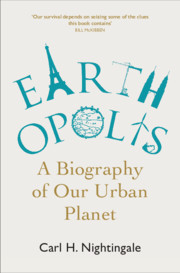Book contents
Part Two - Cities of the World Ocean
Published online by Cambridge University Press: 10 May 2022
Summary
The front matter to “Cities of the World Ocean,” the second of three parts of Earthopolis: A Biography of Our Urban Plane, recounts the founding of Villa Navidad (“Christmas City”), the first European settlement in the Americas by Christopher Columbus and the Taino people, using wooden planks salvaged from the shipwrecked Santa Maria. The story serves to introduce the importance of humanity’s use of solar energy delivered by the winds and currents of the World Ocean to dramatically expand and merge all of Earth’s urban worlds into Earthopolis, a truly planetary Urban Planet for the first time. This development, a hinge between pre-modern and modern eras, rested on state violence delivered worldwide against city walls by gunpowder cannon; on the theft of massive amounts of land, labor, and wealth involved in the birth of global capitalism; and on the globalization of religious and secular knowledges and consumer culture that had impacts on the natural environment worldwide, including the World Ocean itself.
Keywords
- Type
- Chapter
- Information
- EarthopolisA Biography of Our Urban Planet, pp. 155 - 246Publisher: Cambridge University PressPrint publication year: 2022

